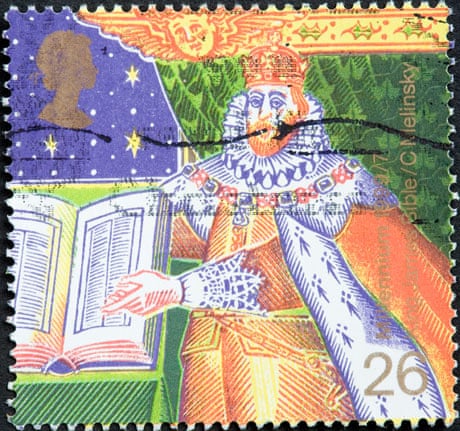Any day now the English-speaking world will start to celebrate a number one bestseller of unprecedented literary significance. That sounds like an oxymoron, but it's actually a quatercentenary. I refer not to the collected works of William Shakespeare but a contemporary rival volume that has not only sold non-stop for 400 years but also shaped our imaginative landscape: the King James Bible.
As well as selling an estimated 1bn copies since 1611, the KJB went straight into our literary bloodstream like a lifesaving drug. Whenever we put words into someone's mouth, or see the writing on the wall, or go from strength to strength, or eat, drink and be merry, or fight the good fight, or bemoan the signs of the times, or find a fly in the ointment, or use words such as "long-suffering", "scapegoat" and "peacemaker" we are unconsciously quoting the KJB. More astounding, compared to Shakespeare's prodigal 31,000-word vocabulary, the KJB works its magic with a lexicon of just 12,000 words.
More than this enthralling matrix of linguistic influence, there's the miracle of the translation itself, a triumph of creative collaboration (54 scholars in six committees), outright plagiarism and good old English pragmatism. The Authorized Version's mission statement was a masterpiece of lowered expectations. Its aim, it declared, was not "to make a new Translation, nor yet to make of a bad one a good one, but to make a good one better, or out of many good ones, one principal good one, that hath been our endeavour".
In its own time, a further aim was not only to help unite the crowns of England and Scotland but to heal religious division and give the word of God to the common people once and for all in the vernacular, without bloodshed or uproar. With some notable contemporary dissent ("It is ill done," wrote one divine. "The edition crosseth me. I require it to be burnt") this was achieved.
In fact, the KJB became, in Adam Nicolson's resonant phrase, "a kind of national shrine, built only of words". Internationally, the expanding English-speaking world became inspired by the majesty of its most sonorous passages, the austere beauty of its prose and the endlessly quoted phrases and periods that have become braided into the texture of contemporary reference. The writers who have paid explicit tribute to the influence of the KJB include TS Eliot, Seamus Heaney, VS Naipaul, Raymond Chandler and PD James. Chandler actually said of the Bible that it was "a lesson in how not to write for the movies".
The afterlife of this landmark publication is nowhere stranger than in the "new-found land" of America. The first New England settlers used the Geneva Bible as a text that appealed to non-conformist congregations. By the end of the 17th century, through a remarkable paradox, the KJB had come to be loved as much by the Americans as the British. Its cadences would seep into the rhetoric of Abraham Lincoln, Martin Luther King and Barack Obama.
A century ago Theodore Roosevelt expressed another important quality of this translation when he declared: "The King James Bible is a Magna Carta for the poor and oppressed: the most democratic book in the world." In modern terms, this tradition is upheld by the worldwide web. Some 450,000 people each month do Google searches for King + James + Bible, of which fewer than 10% originate in the UK.
So how will secular, multicultural Britain celebrate this milestone? The King James Bible Trust will throw a party followed by a range of events, outside the established church, that will include The Bush Bible, 72 plays inspired by the books of the Bible, commissioned by the Bush theatre, staged in St Paul's; James: the Musical; and a competition for new church music inspired by the KJB. Strangely, there are no plans for a non-stop reading of the scripture at any of the premier festivals such as Edinburgh, Cheltenham or Bath, though the Globe will host a full-blown readathon during Easter. Is it not too late for some enterprising festival to remedy this?

